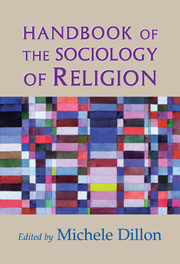Book contents
- Frontmatter
- Contents
- List of Contributors
- Acknowledgment
- Part One Religion as a Field of Sociological Knowledge
- Part Two Religion and Social Change
- Part Three Religion and the Life Course
- Part Four Religion and Social Identity
- Part Five Religion, Political Behavior, and Public Culture
- 21 Religion and Political Behavior
- 22 Religious Social Movements in the Public Sphere
- 23 Mapping the Moral Order
- 24 Civil Society and Civil Religion as Mutually Dependent
- 25 Religion and Violence
- Part Six Religion and Socioeconomic Inequality
- References
- Index
24 - Civil Society and Civil Religion as Mutually Dependent
Published online by Cambridge University Press: 05 June 2012
- Frontmatter
- Contents
- List of Contributors
- Acknowledgment
- Part One Religion as a Field of Sociological Knowledge
- Part Two Religion and Social Change
- Part Three Religion and the Life Course
- Part Four Religion and Social Identity
- Part Five Religion, Political Behavior, and Public Culture
- 21 Religion and Political Behavior
- 22 Religious Social Movements in the Public Sphere
- 23 Mapping the Moral Order
- 24 Civil Society and Civil Religion as Mutually Dependent
- 25 Religion and Violence
- Part Six Religion and Socioeconomic Inequality
- References
- Index
Summary
In a world teeming with violence, oppression, and depravity, it is little wonder that religion should be seen as a solution. Whether as prayer, theology, or saintly inspiration, religion has been both a first and last hope in confronting social ills. But religion is also involved in more secular responses. As a major contributor to what has been termed “civil society,” it can make a social and political difference in two respects. First, at the macro level, religion's various organizations and institutions can play a direct role in the public arena by challenging governmental shortcomings and depredations. Second, at the micro level, religion can foster a sense of “social capital” by giving its lay participants practice in, and encouragement for, participating in wider social and political circles, whether as mere voters or intense activists.
At least this is a theory that has found support in country after country around the globe since the 1980s. To cite just a few examples, the Catholic Church was instrumental in unseating both Brazil's military regime and Poland's Communist state (Glenn 2001); very different Muslim movements have opposed and toppled entrenched governments in Indonesia, and religion has both opposed and been opposed by the state in Iran. Buddhist organizations have been a thorn in the side of political elites in both China and Thailand, and Hindus are demanding changes in the world's largest democracy, India. Certainly U.S. religion offers its own examples of religion in the polis.
- Type
- Chapter
- Information
- Handbook of the Sociology of Religion , pp. 348 - 358Publisher: Cambridge University PressPrint publication year: 2003
- 3
- Cited by



